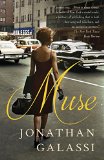Summary | Excerpt | Reading Guide | Reviews | Beyond the Book | Readalikes | Genres & Themes | Author Bio

Critics' Opinion:
Readers' Opinion:
First Published:
Jun 2015, 272 pages
Paperback:
Jun 2016, 272 pages
 Book Reviewed by:
Book Reviewed by:
Darcie R.J. Abbene
Buy This Book
There were other Frankfurts going on simultaneously that Homer and Sally and Paul, who had been attending with them for the past few years, had nothing to do with. The Big (i.e., irrelevant commercial) Publishers, the Random Houses and HarperCollinses and Simon & Schusters and Hachettes, wheeled and dealt multimillion-dollar con- tracts among themselves, though increasingly the agents were holding on to their authors' foreign rights, stalking the halls and booths like hyenas, or even, egregiously, like the upstart McTaggart, setting up their own stands with spiffy little tables and printed catalogs several inches thick handed out by demure young people, aping the publishers themselves (the nerve!). And then there was the religious publishers' Frankfurt; the techies' and scientists' Frankfurt; the illustrated book publishers' Frankfurt; the university press publishers' Frankfurt; the developing world publishers' Frankfurt. Not to mention the hosting German publishers' Frankfurt, which was not just for one-on-one publisher-to-publisher deal making, but for the authors, the critics and journalists—believe it or not, books and writers were still news in Germany—and, after the first couple of days, the public, too. They gawked and dawdled like the tourists they were, till the aisles were virtually impassable.
All these fairs, and others, too, were going on at the same time in the same cavernous spaces, which were like the biggest big-box stores ever built, their denizens streaming into the fairgrounds, riding half-mile-long mobile walkways, hitching rides on commuter trains from the beautiful old central railway station so evocative for Paul of prewar Europe, drinking late into the night in the dangerously crowded lobbies of the hotels, hungover and sleepless and hoarse by day, complaining and fibbing and wheedling and smoking and drinking, gorging and lying and drinking and fucking by night, and having the time of their lives.
To the literary publishers, however, Frankfurt was theirs and theirs alone. They set the tone; they published the Authors Who Mattered—and who sometimes unwisely showed up for receptions and speeches, though those with any self- awareness soon realized they were irrelevant encumbrances to the business at hand. The literary publishers were the Lords of Culture, the master parasites sitting on top of this swarming dunghill. Their sense of their own importance showed when they walked the halls, rolling from side to side as if they were on board an ocean liner—which in a sense they were, without knowing it: a slow-moving Ship of Fools behemoth, heading willy-nilly for the great big digital iceberg. They convened in gemütlich private receptions to which the riffraff were not invited (exclusive invitations were a ritual of the fair, sent out months in advance and occasionally even coveted). They eyed each other sharply but unobtrusively as they fibbed about their latest finds, which might conceivably be but most of the time emphatically were not the Major Contributions to World Literature they aimed to pass them off as. The pros among these gentlemanly thieves understood each other perfectly: where amity ended and commerce held sway; where commerce took a backseat and long loyalty asserted its claims. Homer was widely generous with his information, be it good or bad, and he was a past master at spreading the rumors that were the lifeblood of Frankfurt: that McTaggart was moving Hummock from Gallimard to Actes Sud; that Hum- mock had dumped McTaggart for the Nympho; that the Nympho was selling her agency to William Morris lock, stock, and barrel.
Homer would make special deals to keep certain authors within the inner circle—the cénacle, or cartel, some might call it—of independent houses that was informally run by him and his partners in crime. It was old-fashioned horse- trading, sure, but it often proved salutary for the authors, for over time, if they truly had the stuff (and some of them did; if not, the whole house of cards would have collapsed long ago), their international stature would gradually mature, and their readership would inevitably spread like their publishers' waistlines.
Excerpted from Muse by Jonathan Galassi. Copyright © 2015 by Jonathan Galassi. Excerpted by permission of Knopf. All rights reserved. No part of this excerpt may be reproduced or reprinted without permission in writing from the publisher.





The Flower Sisters
by Michelle Collins Anderson
From the new Fannie Flagg of the Ozarks, a richly-woven story of family, forgiveness, and reinvention.

The House on Biscayne Bay
by Chanel Cleeton
As death stalks a gothic mansion in Miami, the lives of two women intertwine as the past and present collide.

The Funeral Cryer by Wenyan Lu
Debut novelist Wenyan Lu brings us this witty yet profound story about one woman's midlife reawakening in contemporary rural China.
Your guide toexceptional books
BookBrowse seeks out and recommends the best in contemporary fiction and nonfiction—books that not only engage and entertain but also deepen our understanding of ourselves and the world around us.